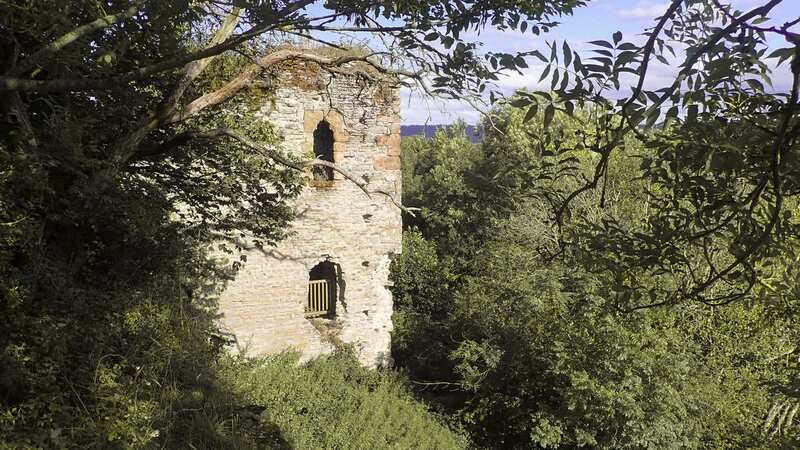A 1,000-year-old castle with its own moat on sale for less than a home in London

Property hunters have the chance to own a 1,000-year-old castle for less than a house in London - after £50,000 was slashed off its £500,000 asking price.
Historic Wigmore Castle, in Herefordshire, is now being offered for £450,000 after failing to attract a buyer since going on the market six months ago. The 956-year-old fortress sits on a massive 29.84-acre plot and has been dubbed one of the UK's 'most remarkable ruins' by English Heritage.
As well as the Grade I-listed castle itself, buyers will also get the sprawling grounds - including a moat, woodland and jousting field. It also comes with planning consent to convert a barn workshop located at the site into a two-bedroomed dwelling, with access via a private driveway.
 The 956-year-old fortress sits on a massive 29.84 acres plot (Sunderlands / SWNS)
The 956-year-old fortress sits on a massive 29.84 acres plot (Sunderlands / SWNS)However, the sale does come with the catch that the grounds have to remain open to the public as English Heritage maintain a right of way for a path to the castle. By law, any property under the guardianship of the Secretary of State must be made open to the public, giving the public access to the grounds.
But English Heritage says anyone buying the site would still be investing in something special. Founded in 1067 by William Fitz Osbern, the Earl of Hereford and a close associate of William the Conqueror, the castle is steeped in history, hosting several kings and queens.
 London flat for rent for £1,400 a month with bed tucked away in kitchen cupboard
London flat for rent for £1,400 a month with bed tucked away in kitchen cupboard
It is nestled amongst the rolling Herefordshire countryside and sports the remains of several turrets and key walls. And while most of the castle site is overgrown, its grounds have become home to a range of rare plants and wildlife.
A spokesperson for Sunderland estate agents said: "A unique and rare opportunity to acquire the historic Grade I Listed Wigmore Castle and grounds with planning consent to convert an existing workshop into a two-bedroomed dwelling. The castle boasts a rich history and was a major centre of power for over 500 years hosting several kings and queens.
 Buyers will also get the sprawling grounds - including a moat, woodland and jousting field (Sunderlands / SWNS)
Buyers will also get the sprawling grounds - including a moat, woodland and jousting field (Sunderlands / SWNS)"The proposed dwelling is located in a private yet elevated position with stunning views over the surrounding countryside and is in an easily accessible location on the edge of the rural village of Wigmore. Wigmore is a picturesque village with a delightful blend of historical heritage, natural beauty, and a thriving local community."
Wigmore Castle was once the stronghold of the turbulent Mortimer family who held it from about 1075 to 1425 when it passed to the Crown. It also has links to the War of the Roses because it was inherited by Richard Plantagenet, Duke of York, who returned to Wigmore in 1455 to gather a large army for the battle of St Albans against Henry VI’s forces.
Richard Plantagenet’s son, who took up his Roses cause, was crowned King Edward IV after defeating Owen Tudor at the battle of Mortimer’s Cross, meaning Wigmore Castle became a royal estate. It remained in possession of the Crown until Queen Elizabeth I sold it to Sir Thomas Harley in 1601.
However, Sir Thomas’s son was an avid supporter of Oliver Cromwell and during the Civil War, his wife ordered Parliamentarian troops to dismantle the castle walls to stop it being used by Royalist forces. The castle later fell into ruin until it was conserved by English Heritage in the 1990s to preserve the surrounding natural environment.
Read more similar news:
Comments:
comments powered by Disqus

































